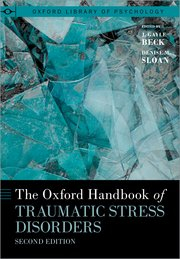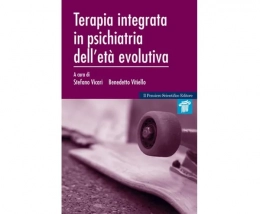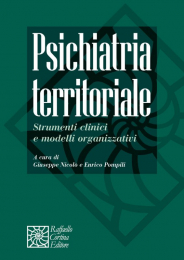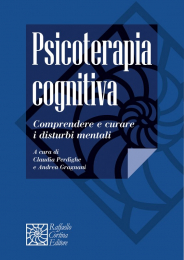Non ci sono recensioni
DA SCONTARE
The experience of traumatic events is a near-universal, albeit unfortunate, part of the human experience. Given how many individuals are exposed to trauma, it is interesting to question why some individuals are resilient in the face of trauma while others go on to develop chronic post-traumatic stress. Throughout the relatively brief history of the psychological study of trauma, a number of themes have consistently emerged; many of these themes remain essential elements within our current study of traumatic stress disorders, as summarized within this volume.
The Oxford Handbook of Traumatic Stress Disorders addresses the current landscape of research and clinical knowledge surrounding traumatic stress disorders. Bringing together a group of highly-regarded experts, this volume is divided into six sections, together summarizing the current state of knowledge about 1) classification and phenomenology, 2) epidemiology and special populations, 3) contributions from theory, 4) assessment, 5) prevention and early intervention efforts, and 6) treatment of individuals with post-trauma mental health symptoms. Throughout the volume, attention is paid to identifying current controversies in the literature and highlighting directions that hold promise for future work.
In this new second edition, experts on traumatic stress contribute chapters on topics spanning classification, epidemiology and special populations, theory, assessment, prevention/early intervention, treatment, and dissemination and treatment. This expanded, updated volume provides research updates and highlights areas that need continued clarification through additional research. With new chapters on adverse childhood experiences, suicide following the experience of trauma, and evidence-based treatments, the second edition provides an up-to-date and valuable resource for clinicians and investigators with interest in traumatic stress disorders.
PART I: Introduction
Chapter 1: Traumatic Stress Disorders: Historical Context and Current Focus
J. Gayle Beck and Denise M. Sloan
PART II: Classification and Phenomenology
Chapter 2: Defining Potentially Traumatic Events: Research Findings and Controversies
Dean G. Kilpatrick
Chapter 3: Classification of Acute Stress Disorder
MacKenzie A. Sayer, Sarah Ostrowski-Delahanty, Maria L. Pacella-LaBarbara, and Douglas L. Delhanty
Chapter 4: Classification of Posttraumatic Stress Disorder
Norah C. Feeny, Alexandra B. Klein, and Kathy S. Benhamou
PART III: Epidemiology and Special Populations
Chapter 5: The Epidemiology of Acute Stress Disorder and Other Early Responses To Trauma in Adults
Quinn M. Biggs, Mary C. Vance, Carol S. Fullerton, and Robert J. Ursano
Chapter 6: The Epidemiology of PTSD Among Adults
Ronald C. Kessler, Corina Benjet, Evelyn J. Bromet, and Anthony J. Rosellini
Chapter 7: Traumatic Stress Disorders in Children and Adolescents
Annette M. LaGreca, Cortney Taylor Zimmerman, Whitney M. Herge, and BreAnne A.Danzi
Chapter 8: Adverse Childhood Experiences and Traumatic Stress Disorders
Damion J. Grasso
Chapter 9: Traumatic Stress in Older Adults
Joan M. Cook and Vanessa Simiola
Chapter 10: Traumatic Stress In Special Populations
Kim T. Mueser and Weili Lu
Chapter 11: Suicide Following Trauma
Erika M. Roberge, Feea R. Leifker, Shelby N. Baker, David C. Rozek, and Craig J. Bryan
PART IV: Contributions from Theory
Chapter 12: Genetics and Genomics of Posttraumatic Stress Disorder
Shannon Cusack, Christina Sheerin, Kaitlin Bountress, Monica Uddin, Nicole R. Nugent, Karestan C. Koenen, and Ananda B. Amstadter
Chapter 13: Biological Contributions to PTSD: Predictors of Long-Term Symptoms
Peter Tappenden, Laura Pratchett, and Rachel Yehuda
Chapter 14: Learning Models of PTSD
Shmuel Lissek and Hannah Berg
Chapter 15: Information Processing in Posttraumatic Stress Disorder
Anke Ehlers, Thomas Ehring, Charlotte E. Wittekind, and Birgit Kleim
Chapter 16: Family Models of Posttraumatic Stress Disorder
Candice M. Monson, Steffany J. Fredman, Rachel Dekel, Naomi Ennis, and Alexandra Macdonald
PART V: Assessment
Chapter 17: Assessing Acute Stress Symptoms
Richard A. Bryant
Chapter 18: Assessing PTSD Symptoms
Michelle J. Bovin and Frank W. Weathers
Chapter 19: Assessing Trauma-Related Symptoms in Children and Adolescents
Rachel M. Hiller, Caitlin Hitchcock, and Vanessa E. Cobham
Chapter 20: Psychometric Concerns in the Assessment of Trauma-Related Symptoms in Older Adults
Willeke H. van Zelst and Aartjan T. F. Beekman
Chapter 21: Assessment of PTSD in Non-Western Cultures
Brian J. Hall
Chapter 22: Assessing PTSD-Related Functional Impairment and Quality Of Life
Colin T. Mahoney and Brian P. Marx
PART VI: Prevention/Early intervention
Chapter 23: Risk and Resilience Factors for Traumatic Stress Disorders
Crystal L. Park, Anica Pless Kaiser, Lucy Finkelstein-Fox, Avron Spiro, III, Jennifer Schuster Wachen
Chapter 24: Community-based Early Intervention With Trauma Survivors
Josef I. Ruzek
Chapter 25: Individual Approaches To Prevention and Early Intervention
Caitlin L.McLean, Mackenzie H. Cummings, Brett T. Litz
Chapter 26: Prevention and Early Intervention Programs For Children and Adolescents
Melissa J. Brymer, Kristine Louie, Alan M. Steinberg, and Robert S. Pynoos
Chapter 27: Prevention and Early Intervention Programs For Older Adults
Karla Caballero, Melba Hernandez Tejada, and Ronald Acierno
Chapter 28: Prevention and Early Intervention Programs for Vulnerable Populations
Emma Cardeli, Seethalakshmi Davis, and B. Heidi Ellis
PART VII: Treatment
Chapter 29: PTSD Treatment Research: An Overview and Evaluation
Paula P. Schnurr and Jessica L. Hamblen
Chapter 30: Empirically Supported Psychological Treatments: Prolonged Exposure
Lily A. Brown and Edna B. Foa
Chapter 31: Empirically Supported Psychological Treatments: Cognitive Processing Therapy
Kathleen M. Chard and Jennifer Schuster Wachen
Chapter 32: Empirically Supported Psychological Treatments: EMDR Therapy
Ad de Jongh, Erik ten Broeke, Derek Farrell, and Louise Maxfield
Chapter 33: Promising Psychological Treatments for Posttraumatic Stress Disorder
Monika M. Stojek, Andrew M. Sherrill, Trevor Stevens, and Barbara O. Rothbaum
Chapter 34: Treating Trauma-Related Symptoms in Children and Adolescents
Elizabeth Pollio, Felicia Neubauer, and Esther Deblinger
Chapter 35: PTSD At Late Life: Context and Treatment
Elissa McCarthy, Joan M. Cook, and Steven R. Thorp
Chapter 36: Treating Trauma-Related Symptoms in Special Populations
Devon E. Hinton and Alison M. Pickover
Chapter 37: Pharmacotherapy for PTSD
James C. West, David Benedek, and Gary H. Wynn
PART VIII: Dissemination and Implementation
Chapter 38: Dissemination and Implementation of Evidence-Based Trauma Interventions for Youth
Hilary E. Kratz, Mary L. Phan, Jacqueline E. Buck, Kelsey Sanner, Alexandra R. Tabachnick, Kelly A. Zentgraf, Rinad S.Beidas
Chapter 39: Dissemination and Implementation of Evidence-Based Interventions for Adults with PTSD
Heidi La Bash and Shannon Wiltsey Stirman
PART IX: Conclusions/Summary
Chapter 40: Traumatic Stress Disorders: Looking Back and Moving Forward
Denise M. Sloan and J. Gayle Beck .




